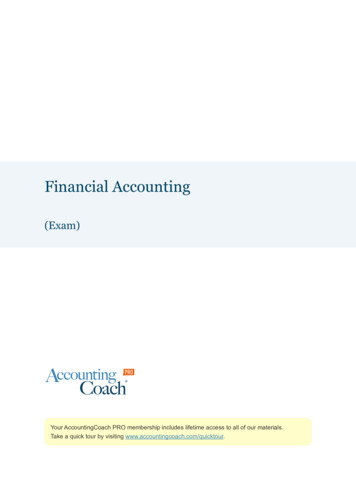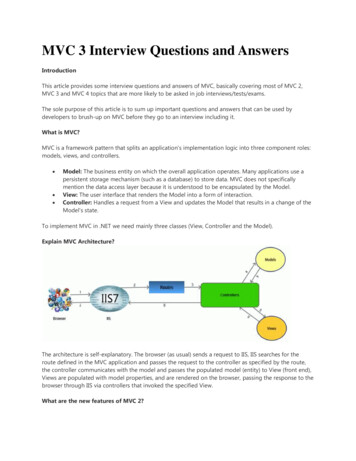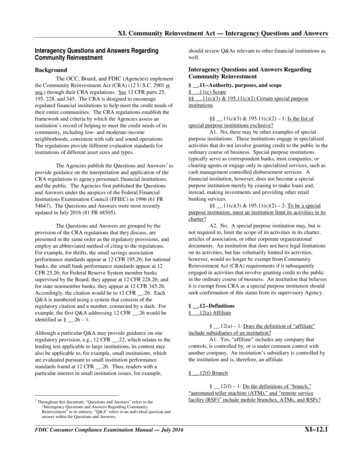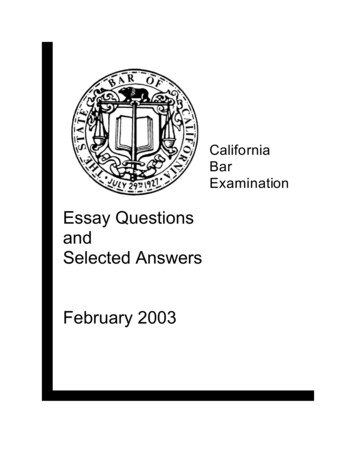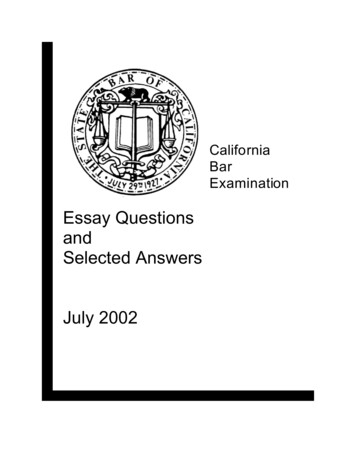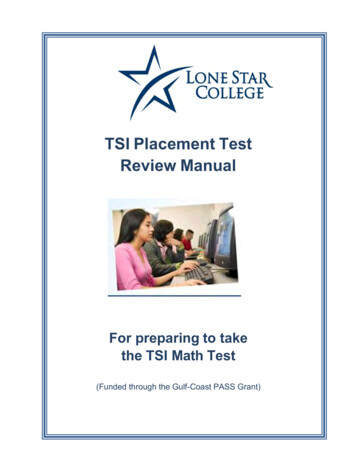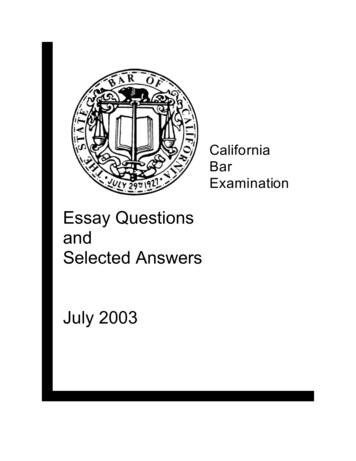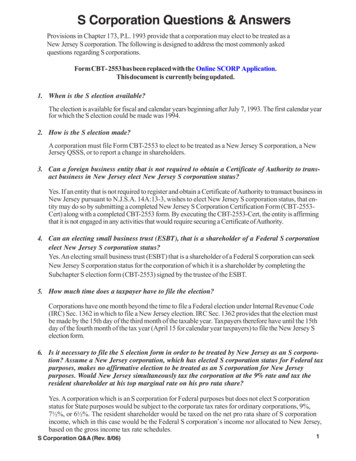
Transcription
S Corporation Questions & AnswersProvisions in Chapter 173, P.L. 1993 provide that a corporation may elect to be treated as aNew Jersey S corporation. The following is designed to address the most commonly askedquestions regarding S corporations.Form CBT- 2553 has been replaced with the Online SCORP Application.This document is currently being updated.1. When is the S election available?The election is available for fiscal and calendar years beginning after July 7, 1993. The first calendar yearfor which the S election could be made was 1994.2. How is the S election made?A corporation must file Form CBT-2553 to elect to be treated as a New Jersey S corporation, a NewJersey QSSS, or to report a change in shareholders.3. Can a foreign business entity that is not required to obtain a Certificate of Authority to transact business in New Jersey elect New Jersey S corporation status?Yes. If an entity that is not required to register and obtain a Certificate of Authority to transact business inNew Jersey pursuant to N.J.S.A. 14A:13-3, wishes to elect New Jersey S corporation status, that entity may do so by submitting a completed New Jersey S Corporation Certification Form (CBT-2553Cert) along with a completed CBT-2553 form. By executing the CBT-2553-Cert, the entity is affirmingthat it is not engaged in any activities that would require securing a Certificate of Authority.4. Can an electing small business trust (ESBT), that is a shareholder of a Federal S corporationelect New Jersey S corporation status?Yes. An electing small business trust (ESBT) that is a shareholder of a Federal S corporation can seekNew Jersey S corporation status for the corporation of which it is a shareholder by completing theSubchapter S election form (CBT-2553) signed by the trustee of the ESBT.5. How much time does a taxpayer have to file the election?Corporations have one month beyond the time to file a Federal election under Internal Revenue Code(IRC) Sec. 1362 in which to file a New Jersey election. IRC Sec. 1362 provides that the election mustbe made by the 15th day of the third month of the taxable year. Taxpayers therefore have until the 15thday of the fourth month of the tax year (April 15 for calendar year taxpayers) to file the New Jersey Selection form.6. Is it necessary to file the S election form in order to be treated by New Jersey as an S corporation? Assume a New Jersey corporation, which has elected S corporation status for Federal taxpurposes, makes no affirmative election to be treated as an S corporation for New Jerseypurposes. Would New Jersey simultaneously tax the corporation at the 9% rate and tax theresident shareholder at his top marginal rate on his pro rata share?Yes. A corporation which is an S corporation for Federal purposes but does not elect S corporationstatus for State purposes would be subject to the corporate tax rates for ordinary corporations, 9%,7½%, or 6½%. The resident shareholder would be taxed on the net pro rata share of S corporationincome, which in this case would be the Federal S corporation’s income not allocated to New Jersey,based on the gross income tax rate schedules.S Corporation Q&A (Rev. 8/06)1
7. Is it necessary for all shareholders to consent to the S election?Yes. For the election to be valid, the corporation and all present shareholders, referred to as initialshareholders, must consent to the election and the jurisdictional requirements of the State. Thecorporation will be required to pay tax, at the highest marginal tax rate, on the pro rata share of Scorporation income allocated to New Jersey for subsequent shareholders who fail to consent to theNew Jersey jurisdictional requirements, N.J.S.A. 54:10A-5.22 and 5.23.8. Is it necessary for the corporation to be a Federal S corporation in order to be able to take theNew Jersey S election?Yes. A New Jersey S corporation is a corporation that is an S corporation as defined by IRC Sec.1361 and has made a valid New Jersey election, N.J.S.A. 54:10A-4(o) & (p) and N.J.S.A. 54:10A5.22.9. What is the procedure for revoking the election?Once an election is made, a corporation remains a New Jersey S corporation as long as it is a FederalS corporation. There is a limited opportunity to revoke an election only during the first tax year to whichan election would otherwise apply. To revoke an election, a letter of revocation signed by shareholdersholding more than 50% of the outstanding shares of stock on the day of the revocation should be filedon or before the last day of the first tax year of the election. A copy of the original election should accompany the letter of revocation. Such a revocation will render the original election null and void frominception.10. Can a corporation elect S status, then revoke S status at the end of the year, then again electS status in the following year?Yes, at the present time. However, under a possible future legal change, an S corporation which revokes its S status would be prevented from reelecting S status for 5 years, similar to IRC Sec. 1362(g).If such a change is made, the public will be notified.11. If shareholders of a Federal S corporation doing business in New Jersey make an election tobe treated as a New Jersey S corporation, what treatment is accorded the undistributedcorporate earnings?The undistributed corporate earnings are not subject to tax at that point in time. However, the balancejust prior to the effective date of the New Jersey S corporation election will become New Jerseyearnings and profits and will be a taxable dividend when distributed to a resident shareholder.12. Are reportable S corporation losses deductible against other New Jersey taxable income onthe shareholder’s gross income tax return?No. S corporation losses and income are included in the category of income “Net pro rata share of Scorporation income.” This category is a net amount of the S corporation income and losses. A net lossfrom S corporations is not deductible against other categories of income because under the GrossIncome Tax Act, losses from one category of income cannot be used to offset income in anothercategory, N.J.S.A. 54A:5-2.S Corporation Q&A (Rev. 8/06)2
13. Assume a New Jersey resident is a 100% shareholder of a Federal and New York State S corporation. This corporation does not do business in New Jersey, and currently does not and isnot required to file a New Jersey corporation business tax return. Does the resident shareholder report the S corporation income (flow through items) on his New Jersey income taxreturn (NJ-1040)? Is the resident shareholder required to file a New Jersey S corporationelection?The resident shareholder is required to report on his NJ-1040 his pro rata share of the Federal Scorporation’s income not allocated to New Jersey. The shareholder is not required to file a NewJersey S corporation election.14. Is there any built-in gains tax for New Jersey for electing S status as there can be for Federalpurposes and, if so, is there a transitional period which would exempt such a tax (IRC Sec.1374 (d)(3), or IRC Sec. 1375 (b)(1)(B)) such as was allowed at the Federal level?To the extent that Federal tax laws impose a corporate level tax on certain S corporation income (forexample, pursuant to IRC Sec. 1374 on built-in gains or IRC Sec. 1375 on passive investment income), the New Jersey tax will be imposed at the full 9% New Jersey corporation level, N.J.S.A.54:10A-5(c)(3). For purposes of the Federal 10-year “recognition period” for recognizing built-ingains, the S corporation may recognize the Federal built-in gain for New Jersey purposes to the sameextent it is recognized on the current year Federal return. The S corporation is not required to reportbuilt-in gain from prior years.15. If a nonresident shareholder sells New Jersey S corporation shares, what is his gain? Does hepay tax on the gain?A nonresident shareholder will not have a gain or loss under N.J.S.A. 54A:5-1(c). The sale or disposition of S corporation stock is a transaction involving an intangible asset which is not taxable for a nonresident for gross income tax purposes under N.J.S.A. 54A:5-8. If, however, thenonresident has income from other New Jersey sources in the year he sells his New JerseyS corporation stock, he must calculate his gain from the sale as if he were a resident and includethe gain in his income from all sources in Column A on Form NJ-1040NR.16. Can a permanent resident holding a green card become a shareholder or officer in anS corporation? Can a resident alien become a shareholder or an officer of an S corporation?The answer to both questions is yes. The “S corporation” standing is a tax status available to certaincorporations. Shareholders of S corporations who are resident aliens would be liable for personalincome taxes.17. What is the tax rate for S corporations?Generally, for Federal tax purposes, S corporations are not taxed at the corporate level. Instead, the income “flows through” to the individual shareholders who are then taxed on the income under the individual income tax. Thus, the Federal S corporation tax treatment eliminates the double taxation of income for most income earned by S corporations. The New Jersey S election statute does notcompletely eliminate the New Jersey corporation business tax for corporations electing New JerseyS Corporation Q&A (Rev. 8/06)3
S corporation status. However, the statute does provide for a reduced corporate tax rate based on thedifference between the highest personal income tax rate and the corporation business tax rate.As of January 1, 2004, the corporation business tax rates are 9%, 7½%, or 6½% depending onincome levels. The highest personal income tax rate is 8.970% for tax years beginning on or afterJanuary 1, 2004.The tax rates for a New Jersey S corporation are as follows:Periods EndingEntire Net IncomeIn excess of 100,000 100,000 or lessfor a 12-month privilege period**Rate*on or afterbut on or beforeJuly 1, 2001June 30, 20061.33%July 1, 2006June 30, 20070.67%July 1, 20070%July 1, 20010%* On entire net income not subject to Federal income tax, as allocable to New Jersey.** A corporation having an accounting period of less than 12 months may qualify forthis reduced rate if its prorated income does not exceed 8,333 per month.To the extent that Federal tax laws impose a corporation level tax on certain S corporation income (forexample, pursuant to IRC Sec. 1374 on built-in gains or IRC Sec. 1375 on passive investment income), the New Jersey tax will be imposed at the full 9% New Jersey corporate level.A corporation doing business in New Jersey which does not make the election to be a New Jersey Scorporation will continue to be taxed as a C corporation for New Jersey corporation business taxpurposes and, therefore, will be subject to the 9% tax rate on all of its entire net income allocable toNew Jersey, N.J.S.A. 54:10A-5(c)(1).18. Does the corporation business tax minimum tax apply to S corporations?Yes. The statute authorizing the S election also raised the minimum tax as follows:Return Period19931994199519961997–20002001 (begins prior to 1/1/02 – ends on or before 6/30/02)2001 (begins 1/1/02 – ends on or before 6/30/02)2002 (begins prior to 1/1/02 – ends on or after 7/31/02)2002 (begins 1/1/02 – ends on or after 7/31/02)DomesticCorporation 2550100150200200210200500 or 2,000*ForeignCorporation 50100200200200200210200500 or 2,000** 2,000 rate applies if taxpayer is member of an affiliated group whose total payroll is 5,000,000 or greater.S Corporation Q&A (Rev. 8/06)4
In the fifth year following calendar year 2002, and each fifth year thereafter, the minimum tax will beadjusted by multiplying the minimum tax for periods beginning in 2002 by an amount equal to one plus75% of the increase, if any, in the annual average total producer price index for finished goods published by the Federal Department of Labor, Bureau of Labor Statistics, for the year preceding thedetermination year over such index for calendar year 2001, N.J.S.A. 54:10A-5(e).19. If a C corporation has a net operating loss (NOL) carryover, to what extent can it continue tobe utilized if the shareholders make the New Jersey S election?The NOL can be used to reduce corporate income subject to the corporation business tax underprovisions found at N.J.S.A. 54:10A-4(k)(6). The NOL deduction would be taken into account incomputing entire net income (the tax base subject to allocation and tax in New Jersey for New Jersey Scorporations for corporation business tax purposes).The NOL cannot be used on the personal income tax return. There is no provision to permit an individual taxpayer to carry forward or carry back an S corporation operating loss on his or her individualreturn.20. Will a New Jersey S corporation that sells its assets and liquidates be subject to a double tax(gain or loss at corporate level as well as gain or loss at shareholder level)? Double tax is notapplicable at the Federal level for S corporations under IRC Sec. 1374(d).Yes. Tax will be imposed at the corporate level at the reduced S corporation rate and the individual shareholders will be subject to gross income tax at their applicable rate.21. If an S corporation is not on a calendar year, is it required to make payments to New Jerseysimilar to those required by IRC Sec. 7519?No. An S corporation must generally use the calendar year unless it can establish a business purpose forhaving a different tax year. New Jersey law has no similar provision relating to such required payments,and accordingly they are not required under New Jersey law.22. Are corporation tax investment tax credits and Urban Enterprise Zone (UEZ) employee taxcredits passed through to S corporation shareholders or taken at the corporation tax level?Investment tax credits and UEZ employee tax credits would be applied by the S corporation against theS corporation tax. They would not be passed through to shareholders.23. Assume a New Jersey corporation has received S status in New Jersey, but is subject to tax inCalifornia and Georgia because those states do not recognize S corporations. Does the shareholder get a credit for the corporation tax paid to those states?No, the shareholder is not entitled to a credit on Form NJ-1040 for corporation tax paid to otherstates. But if the corporation has a regular place of business outside of New Jersey, it can allocate. Otherwise it may be eligible for the credit for taxes paid to other states as a “Section 8adjustment,” N.J.A.C. 18:7-8.3.S Corporation Q&A (Rev. 8/06)5
24. Assume a corporation is a Pennsylvania corporation whose shareholders have elected to betreated as an S corporation for both Federal and Pennsylvania income tax purposes. Thecorporation has two shareholders, one residing in Pennsylvania and the other in New Jersey.The corporation is not required to file corporate tax returns in New Jersey since it does nothave nexus in New Jersey. Does the corporation qualify to elect S status for New Jersey taxpurposes?Yes, the corporation qualifies to elect New Jersey S status but since it has no nexus with New Jersey itis questionable whether the corporation would do so.Differentiate the taxability for New Jersey tax purposes, of corporate profits and dividendpayments for the resident and nonresident shareholders of this particular corporation.Pro rata share of S corporation income is defined in N.J.S.A. 54A:5-10. A resident shareholder of aFederal S corporation which does not make the New Jersey S election would be subject to tax on hispro rata share of S corporation income that is not allocated to New Jersey. Under the facts of thisquestion all of the resident shareholder’s pro rata share of the corporation’s income is allocated outsideof New Jersey and would be subject to tax.The nonresident shareholder would not be subject to tax on any portion of the nonelectingS corporation’s income.Dividend payments for an S corporation are defined at N.J.S.A. 54A:5-1(f) as any distribution in cashor property made by an S corporation, as specifically determined pursuant to N.J.S.A. 54A:5-14.N.J.S.A. 54A:5-14(a) relates the distribution to IRC Section 1368 to the extent it would be treated asa dividend or as a gain under that section. A resident shareholder would be subject to tax on anydividend paid to him. A nonresident shareholder would not be subject to tax on any dividend paid tohim.Presuming the corporation is profitable, would the resident shareholder be allowed a creditfor taxes paid to Pennsylvania on the Pennsylvania S corporation net income which is taxedby Pennsylvania?Under N.J.S.A. 54A:4-1(a) the New Jersey resident shareholder would be eligible for a credit onForm NJ-1040 for taxes paid to Pennsylvania on his pro rata share of the S corporation’s incomewhich is subject to tax by both New Jersey and Pennsylvania.25. What are the New Jersey income tax responsibilities of nonresident shareholders of a NewJersey S corporation?Nonresident taxpayers will report their pro rata share of S corporation income allocated to NewJersey of the New Jersey S corporation, pursuant to N.J.S.A. 54A:5-8(6).S Corporation Q&A (Rev. 8/06)6
26. If the New Jersey S election is not made, will the State of New Jersey in addition to taxingthe corporation’s income, also tax the distributions to resident shareholders?The taxability of a distribution from a Federal S corporation which has not made the New Jersey Selection is first determined based on the corporation’s New Jersey allocation factor.The taxability of the distribution from income allocated outside of New Jersey is determined by usingthe shareholder’s New Jersey adjusted basis, New Jersey Accumulated Adjustments Account (AAA)and New Jersey Earnings & Profits (E&P) and is governed by IRC Sections 1368 and 1371.See the S Corporation Decision Matrix on pages 9–10 for examples of New Jersey resident shareholders of Federal S corporations that have not made the New Jersey S corporation election.27. An Indiana corporation, doing business solely in Indiana, elected S corporation status in1993 for both Federal and Indiana tax purposes. The shareholder is a New Jersey resident.On his 1993 New Jersey resident tax return the shareholder reported the actual distributionsreceived as taxable corporate dividends and did not report the S corporation income. On hisnonresident Indiana return he reported and paid tax to Indiana on S corporation incomederived from Indiana. In 1993, is the shareholder eligible for a credit for tax paid to Indiana?Yes. Since the distribution taxed by New Jersey and the S corporation income taxed by Indiana are ineffect the same dollars, the resident would be eligible for a credit for taxes paid to Indiana on theincome subject to tax by both jurisdictions.For tax year 1994 and forward, assuming the same facts, the shareholder would report theS corporation’s income derived from Indiana sources on his New Jersey resident return andwould be eligible for a credit for taxes paid to Indiana on income subject to tax by both NewJersey and Indiana. The taxability of any actual distributions received by the shareholder would bedetermined using the shareholder’s New Jersey adjusted basis, New Jersey AAA and New JerseyE&P and is governed by the priority system established in IRC Section 1368 and 1371.28. Assume a New Jersey resident owns 100% of the shares of a corporation which elected Federal S corporation status in 1995. The corporation’s Retained Earnings on December 31,1997, are 25,000. A New Jersey S election is made effective January 1, 1998. For 1998, thecorporation has net income of 80,000 and distributes 90,000 to the shareholder. What doesthe shareholder report on his New Jersey resident return?The shareholder will report 80,000 in the income category net pro rata share of S corporationincome.The taxability of a distribution from an S corporation is addressed in N.J.S.A. 54A:5-1(f) and5-14 and is determined by using the shareholder’s New Jersey adjusted basis, New Jersey AAAand E&P and is governed by the priority system established in IRC Section 1368 and 1371.S Corporation Q&A (Rev. 8/06)7
The distribution from the shareholder’s AAA, 80,000, is not reportable. The 10,000 distribution inexcess of the AAA balance is applied to the shareholder’s E&P account and is reportable in the incomecategory dividends.DistributionBeginning balance 1/981998 income1998 distributionApplied to AAAApplied to E&P12/31/98 balanceNew Jersey AAA 90,000(80,000)(10,000)00 80,000(80,000)0New Jersey E&P 25,000(10,000) 15,00029. Does depreciation pass through to the shareholders?Depreciation as allowed under the Gross Income Tax Act is used in determining the shareholder’s pro rata share of S corporation income reportable for gross income tax purposes. Depreciation adjustments required under the New Jersey Corporation Business Tax Act or any otherstate’s law do not affect the shareholder’s New Jersey net pro rata share of S corporation income.S Corporation Q&A (Rev. 8/06)8
S Corporation Decision MatrixFor State of New JerseyShareholder PercentageResidencyof Shares FederalStatusStatusOwnedResident50%SNew Jersey Election Status forCorporate Entire Net IncomeN.J.S.A. 54:10A-4(k)S Corporation IncomeAllocated to New JerseyN.J.S.A. 54:10A-6, 10N.J.S.A. 54A:5-10cAllocating corporation(0% to New Jersey)50% of 100 50(S corporation income notallocated to New JerseyN.J.S.A. 54A:5-10)Allocating corporation(70% to New Jersey)50% of 70 35(S corporation incomeallocated to New JerseyN.J.S.A. 54A:5-10) 50% of 30 15(S corporation income notallocated to New Jersey;N.J.S.A. 54A:5-10)New Jersey S corporation(CBT-100S New Jerseyallocated corporateincome taxed at 2.350%as of 1/1/94 N.J.S.A.54:10A-5(c)(2)&(3))Nonallocating corporation(100% to New Jersey)Nonresident50%SNew Jersey S corporation(CBT-100S New Jerseyallocated corporateincome taxed at 2.350%as of 1/1/94 N.J.S.A.54:10A-5(c)(2)&(3))Allocating corporation(0% to New Jersey)Allocating corporation(70% to New Jersey)Nonallocating corporation(100% to New Jersey)Resident50%SNot New JerseyS corporation(CBT-100 New Jerseyallocated corporateincome taxed at 9%as of 1/1/94 N.J.S.A.54:10A-5(c)(1))S Corporation Q&A (Rev. 8/06)Shareholder’s Pro RataShare of S CorporationIncome Subject to Tax(assumes 100 income)N.J.S.A. 54A:5-10Allocating corporation(0% to New Jersey)50% of 100 50(S corporation incomeallocated to New JerseyN.J.S.A. 54A:5-10)50% of 0 0(S corporation incomeallocated to New JerseyN.J.S.A. 54A:5-8(6))50% of 70 35(S corporation incomeallocated to New JerseyN.J.S.A. 54A:5-8(6))50% of 100 50(S corporation incomeallocated to New JerseyN.J.S.A. 54A:5-8(6))50% of 100 50(S corporation income notallocated to New JerseyN.J.S.A. 54A:5-10)Allocating corporation(70% to New Jersey)50% of 30 15(S corporation income notallocated to New JerseyN.J.S.A. 54A:5-10)Nonallocating corporation(100% to New Jersey)50% of 0 0(S corporation income notallocated to New JerseyN.J.S.A. 54A:5-10)9
S Corporation Decision MatrixFor State of New Jersey (continued)Shareholder PercentageResidency of Shares FederalStatusOwnedStatusNonresident50%SNew Jersey Election Status forCorporate Entire Net IncomeN.J.S.A. 54:10A-4(k)Not New JerseyS corporation(CBT-100 New Jerseyallocated corporateincome taxedat 9% as of 1/1/94N.J.S.A. 54:10A-5(c)(1))Resident50%CNot New JerseyS corporation(Cannot elect since notFederal S. CBT-100New Jersey allocatedcorporate income taxedat 9% as of 1/1/94N.J.S.A. 54:10A-5(c)(1))Nonresident50%CNot New JerseyS corporation(Cannot elect since notFederal S. CBT-100New Jersey allocatedcorporate income taxedat 9% as of 1/1/94N.J.S.A. 54:10A-5(c)(1))S Corporation Q&A (Rev. 8/06)S Corporation IncomeAllocated to New JerseyN.J.S.A. 54:10A-6, 10N.J.S.A. 54A:5-10cAllocating corporation(0% to New Jersey)Allocating corporation(70% to New Jersey)Nonallocating corporation(100% to New Jersey)Allocating corporation(0% to New Jersey)(minimum CBT payer)Allocating corporation(70% to New Jersey)Nonallocating corporation(100% to New Jersey)Allocating corporation(0% to New Jersey)(minimum CBT payer)Allocating corporation(70% to New Jersey)Nonallocating corporation(100% to New Jersey)Shareholder’s Pro RataShare of S CorporationIncome Subject to Tax(assumes 100 income)N.J.S.A. 54A:5-10None(No New Jersey nexusor jurisdiction)None(Not taxed under N.J.S.A.54A:5-8(6) since not aNew Jersey S corporation)None(Not taxed under N.J.S.A.54A:5-8(6) since not aNew Jersey S corporation)Shareholder taxed onlyon dividend paid(N.J.S.A. 54A:5-1f)Shareholder taxed onlyon dividend paid(N.J.S.A. 54A:5-1f)Shareholder taxed onlyon dividend paid(N.J.S.A. 54A:5-1f)Shareholder not taxed ondividend paid; no jurisdiction over shareholderShareholder not taxed ondividend paid; no jurisdiction over shareholderShareholder not taxed ondividend paid; no jurisdiction over shareholder10
The answer to both questions is yes. The fiS corporationfl standing is a tax status available to certain corporations. Shareholders of S corporations who are resident aliens would be liable for personal income taxes. 17. What is the tax rate for S corporations? Generally, for Federal tax purposes, S corporations are not taxed at the corporate .
